Ramūnas Čižas, farmhouse brewer
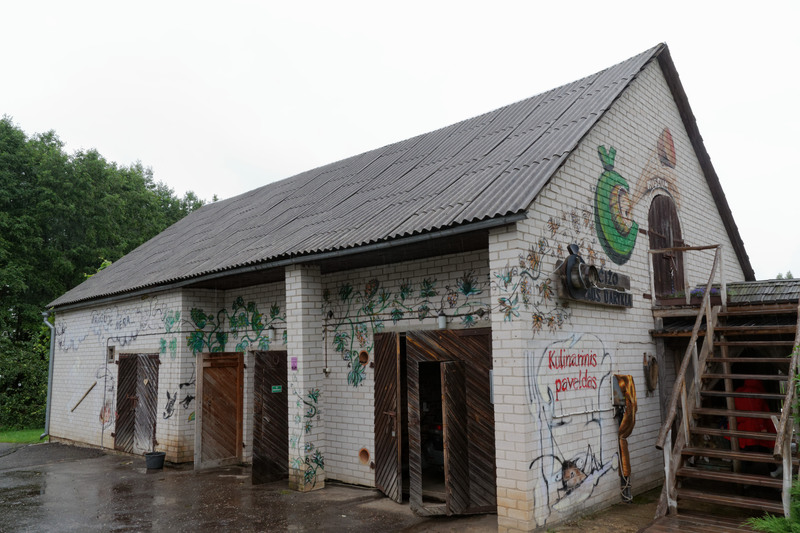
The brewery |
Suddenly, we turn off the road, to stop next to a white-brick barn, decorated with beery graffiti text and drawings. We pass through an opening into a kind of roofed terrace with wooden tables and benches, walls made of woven branches. It's simple, rough, and so pleasing to the eye that I involuntarily say "wow", and not for the last time. (This is part 3 of the Lithuanian brewery tour.)
We sit down, the brewer pours us a beer, and starts talking. And immediately it's clear that Ramūnas Čižas is not just a brewer, but also a personality. He explains that he's a brewer in the third generation, and is carrying on the farmhouse brewing traditions of his ancestors. This means not just brewing in much the same way as them, but also using the yeast he has inherited from his grandfather. Commercial lab yeast is not for him. (And, yes, this is the unique Lithuanian yeast species you may have heard of.)
We ask about the yeast, but he will not be drawn, saying that "we can talk about my house, my gun, my wife, but we will not talk about my yeast". He says he has "two beautiful daughters", but he doesn't know if the eldest will carry on the brewing tradition. Being in position to inherit, however, she's the only other person in the family to be allowed near the yeast. His younger daughter is not, nor is his wife. I'm reminded of Belgian family brewers I've met, who also have a near-religious relationship with their yeast.
The beer is a "keptinis", that is, a dark beer where the malt is baked into a bread-like shape in an oven before mashing. He explains that traditionally, dark beer was sacred, and the brewing of it an important ritual performed by women. In the 16th/17th centuries, dark beer was kind of like altar wine. Probably, this is a left-over from the pagan religion Lithuania had held onto until, as the last state in Europe, it officially (but probably fairly superficially) adopted Christianity under duress in 1387.
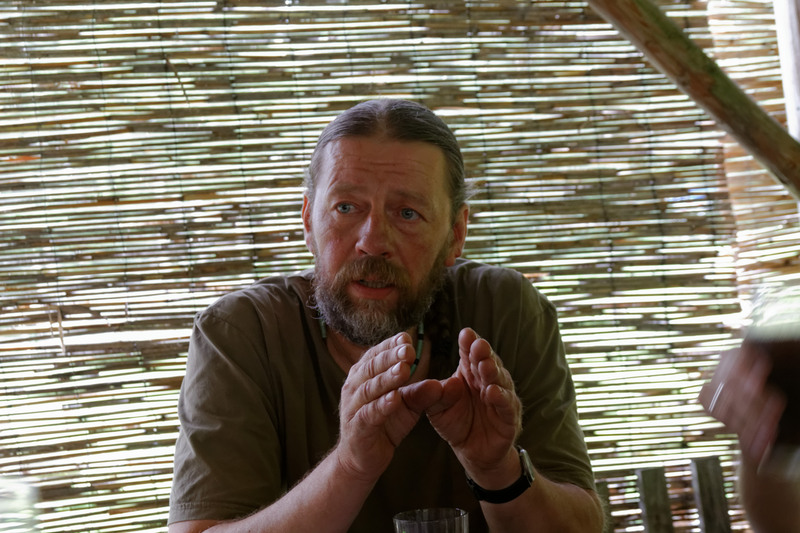
Čižas talking |
Čižas seems to confirm this link when he says that "my god is not in the church, he is in the forest". He says it's important to him to carry on the culture of his ancestors, and to try to do things the same way they did. He launches into an account of Lithuanian history and beer that I can't quite follow, but which makes it abundantly clear that this is a man who knows his history.
But I am forgetting the beer. By sight it looks fairly normal, with a coarse beige head that tells us it doesn't have much carbonation (of course not, if it's really traditional), with a hazy dark body. Smelling it I'm struck by the rich fruity, banana-like aroma of it, kind of earthy and musty like an earth cellar. You can tell that the yeast has been doing unusual things, producing much more esters than normal. The yeast profile is surprisingly similar to Finnish sahti made with baking yeast.
By taste it's fairly dry, and surprisingly clean for a beer produced with home-grown yeast. It's resiny, with the same yeast profile, roasty and vaguely smoky. There are also traces of rye, and in some ways the beer brings to mind aspects of both roggenbier and sahti. It's clean and easy to drink, surprisingly refined for so traditional a beer. Interestingly, the traditional Norwegian farmhouse ales I've had had that same quality. (If you want to try the beer, Alaus Namai in Vilnius usually has it draft.)

On the terrace |
Suddenly, he pours us another beer. This one is his gira (kvass). It looks like any kvass: no head, hazy brown body. Smelling it, I burst out laughing. All of a sudden, I'm in the kitchen of the house I grew up in, watching my mother kneading dough. The aroma is so exactly that of home-made bread dough it's almost eerie.
The taste has the same sweet bready dough flavor, joined by raisiny rye notes. It's straightforward, fresh, and a marvel to drink. In years of beer hunting in Eastern Europe this is far and away the best kvass I've tasted, a product so amazingly drinkable it puts this whole drink in a new light for me. In the background I hear someone muttering "now you know what kvass is", but I'm too blown away to notice who.
He starts talking about his philosophy of beer-making. Factory-made food always tastes the same, but French cheese artisans are like an actor who's played the same role for 15 years. It's the same role, yet it's always different, because one day he'll have slept badly, another he's argued with his wife. The nuances are what brings life to the product. He implies it's the same way with his beer. He respects the traditions. He can't make things with his left hand. He uses no exact figures. The mash bread bakes for an hour, roughly, but he doesn't measure the time. He uses no thermometer, either. If he gets up in the morning and doesn't feel like brewing, he won't.
When we ask to see his brewery he asks us which one. It turns out he has two: he's kept his grandfather's equipment and still uses it on special occasions. He also has the "real brewery", which is the one he normally brews in.
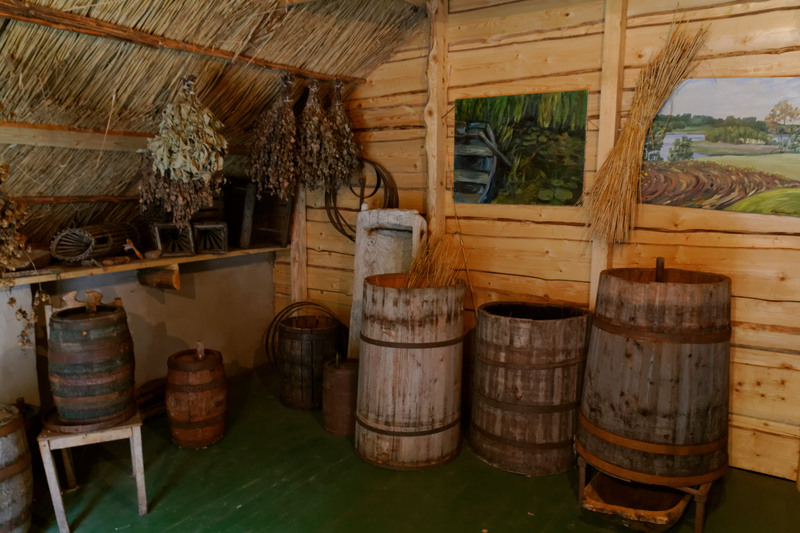
Grandfather's brewery, rye straw filter on far right |
His grandfather's brewery is all wooden, except for a millstone he hand-turns to crush the malt. He uses a wooden barrel filled with rye straw to filter the mash, and here is perhaps the source of the rye flavour we found. He says the rye straw contains bacteria that "are friendly to the yeast". The straw filter is very important to the taste, he says.
So here we have a brewer using not just his own family yeast for fermentation, but also bacteria from rye straw. I never heard of anything like it, except possibly the microflora in geuze barrels combining with wild yeast from the air.
His own brewery is much more modern and mostly steel. He uses a semi-open fermenter where the pressure can lift the lid to blow off the excess. He admits to baking the loaves in an electric oven, shrugging as if to say that while respecting the traditions is important, a bit of pragmatism is also necessary.
He does step-mashing, and bakes the loaves during the first pause. There seems to be a whole set of beliefs around the various pauses. He also uses his fingers to judge the temperature, but uses different fingers for the different pauses, to get the temperature right. He says that knowledge of this technique used to be considered a great secret.
He uses Czech malt rather than Lithuanian, he says, "because it's too expensive". He also uses German noble hops rather than Lithuanian, because the yield from the local hops is so low that to replace 700 grams of German hops he'd need 10 kilos of Lithuanian hops. (Which explains why Per Kølster was shocked at the amount of hops Lithuanian homebrewers used.) Several people tell us that for this reason only the home brewers use local hops, since commercial brewers cannot get hold of sufficient quantities.
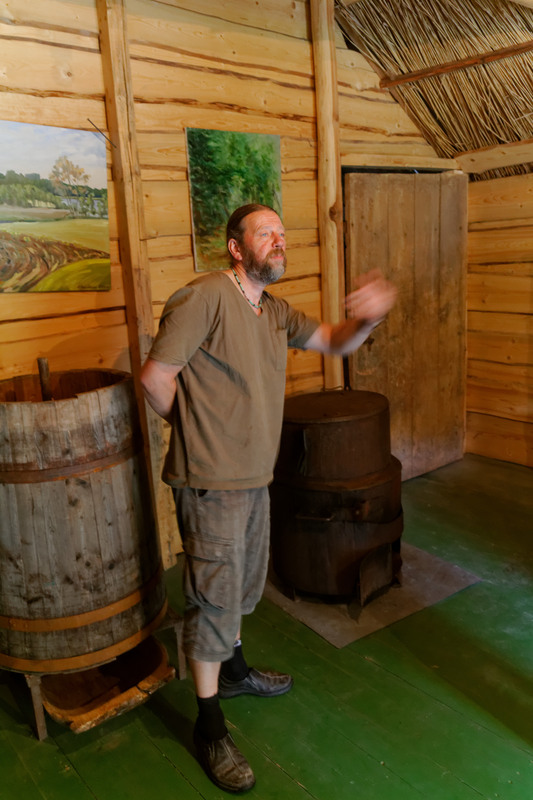
Čižas talking |
Although he describes this brewery as the real one, it's clear that he combines it with his grandfather's equipment. In a corner he's even kept some of his father's brewery. He says that as the years go by he uses less and less technology. The older, more labourious methods are "more morally pleasing" to him.
There are other brewers that brew with ancient methods, like Bøgedal in Denmark, but they built their breweries from scratch. This is my first meeting with someone who doesn't just do it the old way, but who inherited technique, equipment and even yeast in an unbroken chain from the past. There cannot be many people on this earth in the same position.
He says of himself that he's figured out his life. "I've found a job that makes me happy," and indeed he looks that way. He reminds me of other family brewers I've met who clearly don't have brewing as their day-time job, but are brewers, living and breathing what they do.
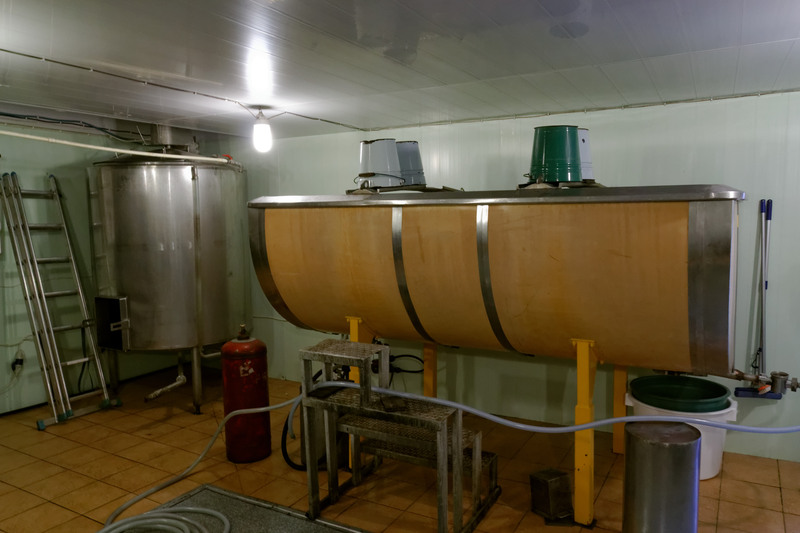
The modern brewery |
I point to a dried hop bine in a corner of the brewery, saying "look, Lithuanian hops." Čižas grins and points out through the door. I slap my forehead. The climbing plant crawling onto the roof is of course Lithuanian hops. He explains that he uses both local hops and malts for educational purposes. He sometimes has groups of students from various places over to teach them about the old ways. He holds up some of the rye straw, splintering it between his fingers, laughing and saying "plastika, plastika". Some of the students think the straw is plastic!
He tells us that every year he goes to a kind of heritage festival in Kernavė (the ancient capital), where participants pick a century and then live entirely as if they were in that century. That is, they eat, dress, sleep and speak as if they did. Sensibly, cameras are an exception to the rule. He takes his grandfather's equipment to this festival and brews beer with it. (Later I learn there is a whole range of festivals of this type, the biggest being one called Black Horned Moon.)
As we are leaving I see Čižas trying to give our interpreter a bottle of his beer, and her politely declining, knowing it will not travel well and that we cannot split it. In my mind's eye I see him still, the brewer-philosopher, beaming with arms outstretched, 1-liter plastic bottle in hand, saying "please don't take away from me the joy of giving you a gift". Now that he'd given us the joy of meeting him, how could we?
Similar posts
Keptinis, Lithuanian baked beer
Farmhouse ale styles are known for being messy, sprawling, ill-defined categories to the point where it can be questioned whether they really are styles at all
Read | 2015-04-20 12:36
Vilnius: a beer guide for the impatient
My guidebook to Lithuanian beer has all the detailed information, but for those who are going to Vilnius and don't want to read 100 pages of detailed text, there isn't anything available now
Read | 2015-03-04 15:26
How to brew keptinis
Keptinis is a little-known Lithuanian style of beer where the mash is baked in an oven
Read | 2018-07-11 15:44
Comments
Alex Barry - 2013-08-17 13:42:37
Thanks for a well-written and most interesting article, Lars! Referred to me by Pivní Filosof on Facebook, where I have now found and begun following you, for more of the same. Cheers!
er - 2013-09-21 15:56:59
Cizas always likes bragging about his special yeast, telling he inherited it from his granfather. I think it is nothing else but commercial advertising trying to introduce his beer as special one. I once asked Cizas about this yeast, As always he started talking the same thing about it being inherited from his grandfather, but as the conversation went on I understood that he uses ordinary baking yeast.
Lars Marius - 2013-09-23 03:14:50
@er: It's hard to know for certain. I'm still hoping that a DNA sequencing of his yeast can be done. That would answer the question definitively.
Christian Pedaschus - 2014-01-02 17:23:30
Thanks for the well written article, makes me wanna be there, now :)
DanABA - 2015-03-06 15:05:31
Wow... just wow. Thank you for writing this.
badleebrewed - 2015-03-06 22:19:58
I have had a morning of Wow,oh my lord! moments,chasing Lituanian farmhouse ale stories. Thank you so much for the work you put in. Here is to one day getting my hands on some Lithuanian yeast.
Lars Marius - 2015-04-10 06:35:58
@er: I took a sample of his yeast from the beer, and it's now been analyzed at a lab in the UK (NCYC). The analysis shows that it's a mixture of four unrelated yeast strains. That means it's definitely not ordinary baking yeast.
Nick Charles - 2019-03-11 15:12:22
Lars, First off, I can't thank you enough for all the work you've done and so generously offered on your blog! Just, wondering, might we see Gårdsøl - det norske ølet in an English version, soon? All the Best, Nick
Lars Marius Garshol - 2019-03-11 16:28:46
@Nick: Thank you! Unfortunately, there doesn't seem to be any prospect of the book being translated. However, I'm working on a different book in English on the same subject, which I think will be a good substitute.
Nick Charles - 2019-03-12 16:51:05
I wonder if the Brewers Association <www.BrewersAssociation.org> might be a path in for a translation of "Gardsol", if you haven't tried that one already? Please do keep us all posted about your new book in English and many thanks again!
Lars Marius Garshol - 2019-03-12 17:00:34
@Nick: Brewers Publications, the publishing arm of the Brewers Association, is publishing my next book. :)
I will post on the blog when I know the publishing schedule better. Right now it looks like I'll hand in the manuscript before the summer and that it will be published in 2020.
Borbíró András - 2019-06-06 14:23:39
Dear Lars! Your travel reports/essays are always a joy to read. It warms my heart that there are people who take pride in keeping traditional methods alive and who find joy in flavours that are hard to achieve but are complex and exciting.
I am waiting for your English book!
Cheers,
András from Hungary